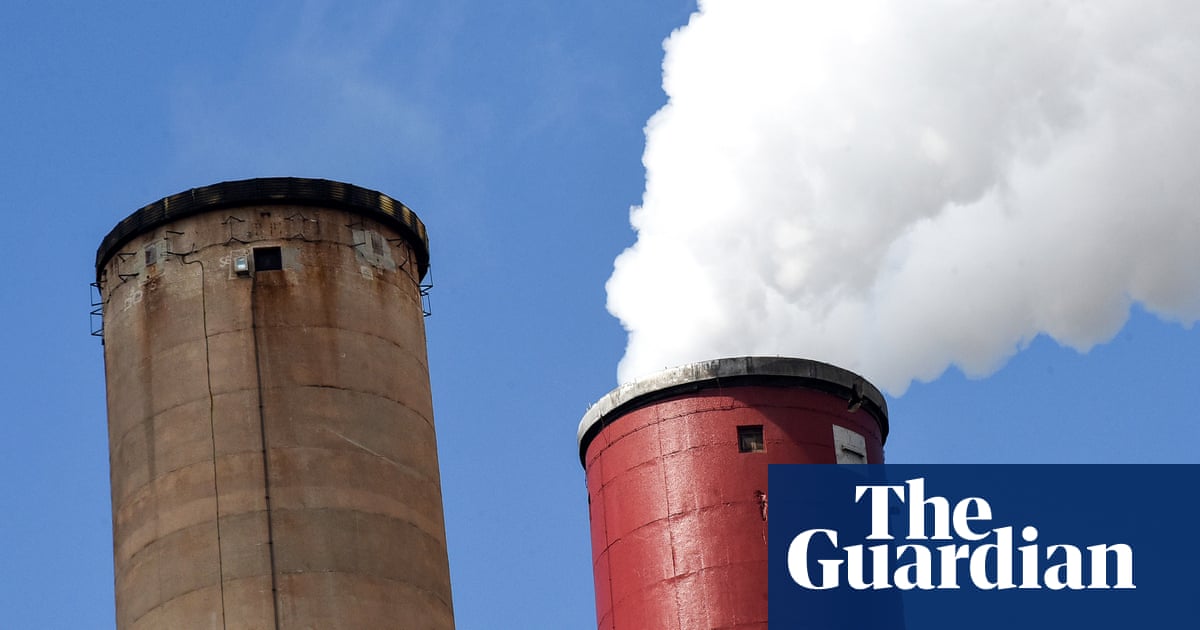US power plants will be allowed to pollute nearby communities and the wider world with more unhealthy air toxins and an unlimited amount of planet-heating gases under new regulatory rollbacks proposed by DonaldTrump’s administration, experts warned.
TheUS Environmental Protection Agency(EPA) unveiled a plan on Wednesday that would repeal a landmark climate rule that aims to mostly eliminate greenhouse gases from power plants by the 2030s and would, separately, weaken another regulation that restricts power plants’ release of hazardous air pollutants such as mercury.
“We choose to both protect the environment and grow the economy,” said Lee Zeldin, administrator of the EPA, at an event to announce the plans. He said the rollbacks will save households money while also defying what he called “the climate change cult”.
The climate rule has “saddled our critical power sector with expensive, unreasonable and burdensome regulations”, Zeldin said. “American energy suffered and Americans who rely on reliable, affordable energy suffered. The good news is those days are over.”
The EPA’s proposals will go out for public comment and are likely to face legal challenges.
They target a rulecraftedlast year by theBiden administrationto phase out emissions from electricity-producing fossil fuel plants, which are responsible for around a quarter of US greenhouse gases, and a regulation called the Mercury and Air Toxics Standards, which Bidentoughenedin 2023 to slash harmful pollution suffered by communities.
These rollbacks come despite overwhelming scientific evidence of the dire consequences of the worsening climate crisis and the harm caused by pollutants such as mercury, which can seep into water, soils and the air and has been linked to neurological damage in young children as well as heart, lung and immune system ailments in adults. Coal-fired power plants cause nearly half of all mercury emissions in the US, according to the EPA.
More than 200 health expertswroteto the EPA on Wednesday warning the moves “would lead to the biggest pollution increases in decades and is a blatant give-away to polluters”. The experts added the reversals are “a direct contradiction to the Environmental Protection Agency’s mission of protecting public health and the environment”.
Trump, however, has vowed to boost fossil fuel production at all costs, having reaped record donations from the oil and gas industry during his election campaign. At Wednesday’s EPA event, Zeldin was joined by eight lawmakers, all Republicans – Kevin Cramer, Troy Balderson, Brett Guthrie, Carol Miller, Dan Meuser, Rob Bresnahan, Michael Rulli and Riley Moore – who have collectively received more than $3m from fossil fuel donors in their own election campaigns, a Guardian analysis of the OpenSecrets database shows.
Bresnahan, a Pennsylvania representative,holds personal financial interestsin more than 20 fossil fuel companies.
In justifying the deletion of the Biden climate plan, which the EPA previously estimated would deliver $370bn in net benefits, Zeldin has claimed that US power plants only produce a small and declining fraction of the world’s emissions. This is despite the fact that if these power plants were a country, itwould be the sixth-largest emitter on the planet.
Gina McCarthy, who was EPA administrator under Barack Obama, said that Zeldin’s “dismantling of our nation’s protections from power plant pollution is absolutely illogical and indefensible. It’s a purely political play that goes against decades of science and policy review.”
“By giving a green light to more pollution, his legacy will forever be someone who does the bidding of the fossil fuel industry at the expense of our health,” she added. “Everyone will be affected by his actions, but the most vulnerable among us, our kids and grandkids, will suffer the most.”
The EPA has embarked upon a wide-ranging blitz upon environmental regulations since Trump became president, setting about removing or loosening clean air and water rules that, collectively,were on track to save200,000 American lives in the decades ahead.
Trump, who has adopted the mantra of “drill, baby, drill”, has claimed unhindered fossil fuel production will bring down energy costs, although he has sought to hobble clean energy such as solar and wind, which are typically the cheapest sources of new electricity generation.
The rollbacks follow thesecond-hottest May on recordglobally, and a record-hot 2024 that unleashed a stunningnumberof climate-driven disasters and six weeks ofextra-dangerously hot days. Experts havewarnedthat sea level rise is on track to cause “catastrophic inland migration”, including tomillions of Americans, with climate shocksset to wipe50% from global GDP by the end of this century.
“It’s completely reprehensible that Donald Trump would seek to roll back these lifesaving standards and do more harm to the American people and our planet just to earn some brownie points with the fossil fuel industry,” said Patrick Drupp, climate policy director at the Sierra Club.
“This administration is transparently trading American lives for campaign dollars and the support of fossil fuel companies, and Americans ought to be disgusted and outraged that their government has launched an assault on our health and our future.”
